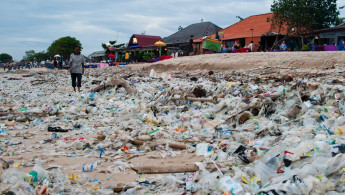Brexit 'loopholes' allow UK to keep up waste dumping in developing countries
While the European Union is putting in place regulations to stifle this approach, London relies on legal loopholes to carry on with business as usual, environmental organisations say.
The United Kingdom is evading its promise to reduce the shipment of plastic waste to developing countries by adopting, after it leaves the EU, less strict rules on this subject matter. Unclassified plastic waste has been banned from being transferred from European Union countries to non-OECD countries as of January 1, when amendments to the Basel Convention, which focuses on stopping dumping by rich countries, came into effect.
Despite the British government’s commitment to ban the export of plastic waste to developing countries and to not to regress on environmental standards after Britain's exit from the European Union, London decided to adopt a new system of waste export.
This requires the prior approval from the importing country, which has the right to refuse, but this is seen by some as a loophole that allows Britain to continue sending its plastic.
Read also: Tunisia cracks down with arrests in Italy hazardous waste scandal
Britain exports about two-thirds of its plastic waste and is second only to the United States in the production of this non-biodegradable material. In 2019, the Conservative Party said it would push the country to “lead the world in tackling plastics pollution” and “ban the export of plastic waste to non-OECD countries.”
Sam Chetan-Welsh, an activist with the global environmental organization Greenpeace in the UK, told The New Arab that the British government had made formal commitments to ban the export of plastic waste to non-OECD countries.
|
“Our government promised to uphold EU environmental standards after Brexit," he added "The fact that it is instead creating loopholes to allow our plastic waste to be dumped [abroad] is a very bad thing. It has failed to uphold its minimum pledges.""Why did Britain adopt easier standards than those signed by the European Union and failed to stop exporting mixed plastics to developing countries?" Chetan-Welsh said.
The UK is shipping its waste to Malaysia, Pakistan, Vietnam, and Indonesia, which don’t have the capacity or facilities to properly manage the waste. Most of it is burned or buried, which has knock-on effects for local communities.
Jim Puckett, director of the Basel Action Network, told The New Arab he was “shocked to see that [the UK] chose to take a much weaker control measure that would allow it to continue exporting polluted plastics, which are difficult to recycle, to developing countries.”
BAN insists that the UK was aware of the EU’s plans to prohibit the export of mixed and contaminated plastic from as early as April 2019 and had almost two years to transpose the EU plastic waste export ban into UK law.
The UK’s Department for Environment, Food and Rural Affairs (DEFRA) insists it is committed to tackling plastic pollution.
“The UK government is a global leader in tackling plastic pollution and is committed to clamping down on illegal waste exports,” it said in a statement.
“We have pledged to ban the export of all plastic waste to non-OECD countries and to introduce tougher controls on waste exports, including mandatory electronic waste tracking which will make it harder for criminals to obtain and export waste illegally.”
Follow us on Facebook, Twitter and Instagram to stay connected





 Follow the Middle East's top stories in English at The New Arab on Google News
Follow the Middle East's top stories in English at The New Arab on Google News
![Netanyahu furiously denounced the ICC [Getty]](/sites/default/files/styles/image_330x185/public/2024-11/GettyImages-2169352575.jpg?h=199d8c1f&itok=-vRiruf5)
![Both Hamas and the Palestinian Authority welcomed the ICC arrest warrants [Getty]](/sites/default/files/styles/image_330x185/public/2024-11/GettyImages-2178351173.jpg?h=199d8c1f&itok=TV858iVg)
